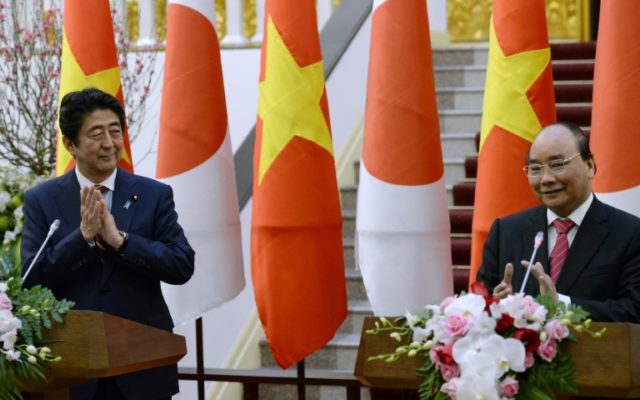Japanese Prime Minister Shinzo Abe met with Vietnamese Prime Minister Nguyen Xuan Phuc in Tokyo on Monday and agreed to work together against China’s territorial aggression in the South China Sea.
The South China Morning Post notes Phuc took pains to avoid calling out China by name, but when he welcomed Japanese support for “economic prosperity, freedom of trade, and safety of navigation in the Indo-Pacific region,” it was obvious who those freedoms need to be protected from.
Vietnam has active territorial disputes with China in the region, while Japan relies on South China Sea shipping lanes that Beijing might decide to compromise with its militarized islands and growing navy. Abe said he was “hand-in-hand with Prime Minister Phuc” on the freedom of the Indo-Pacific region.
Japan is hosting the Mekong-Japan Summit on Tuesday, which also includes Cambodia, Laos, Myanmar, and Thailand.
Japan Times saw the summit as an opportunity for Japan to flex its “financial muscle” and develop a regional alliance that can compete with China’s Belt and Road infrastructure project. “Quality infrastructure” is one of the major points on the summit agenda. Japan often uses that term to imply Japanese construction work costs more than Chinese projects because the quality of Japanese work is much better.
Prime Minister Abe noted his country has invested heavily in the Mekong region over the past few years, as has the Association of Southeast Asian Nations (ASEAN), and promised more loans and investment will be forthcoming as Japan encourages the Mekong countries to become a major manufacturing hub.
“The Mekong region has big potential for growth and prosperity,” Abe said.
Another topic at the summit was North Korea, which could become another point of contention between China and the Mekong alliance. The summit declaration included a demand for North Korea to take concrete steps toward denuclearization, while China has lately insisted North Korea has taken such steps and deserves to be rewarded with looser sanctions.

COMMENTS
Please let us know if you're having issues with commenting.